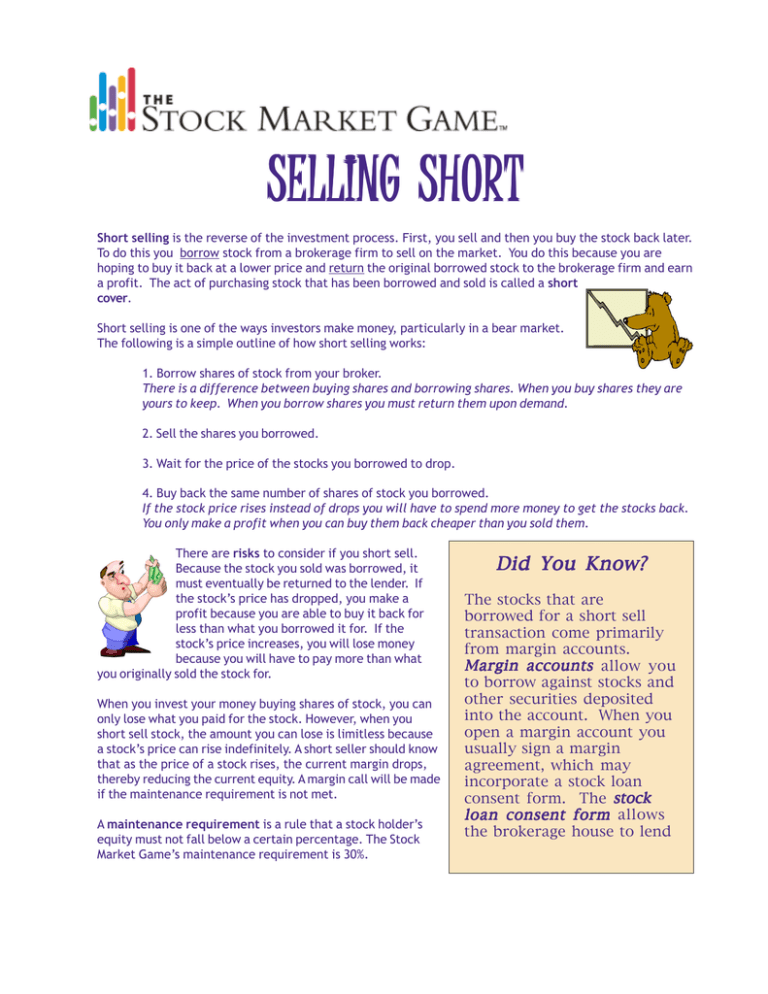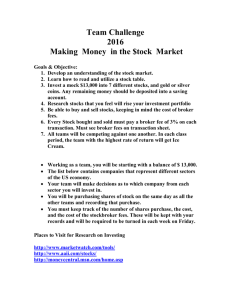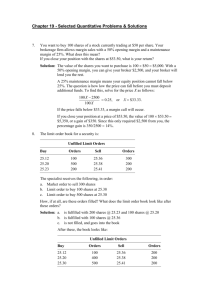SELLIN G SHOR SELLING SHOR G SHORTTTTT
advertisement

SELLING SHORT Short selling is the reverse of the investment process. First, you sell and then you buy the stock back later. To do this you borrow stock from a brokerage firm to sell on the market. You do this because you are hoping to buy it back at a lower price and return the original borrowed stock to the brokerage firm and earn a profit. The act of purchasing stock that has been borrowed and sold is called a short cover. Short selling is one of the ways investors make money, particularly in a bear market. The following is a simple outline of how short selling works: 1. Borrow shares of stock from your broker. There is a difference between buying shares and borrowing shares. When you buy shares they are yours to keep. When you borrow shares you must return them upon demand. 2. Sell the shares you borrowed. 3. Wait for the price of the stocks you borrowed to drop. 4. Buy back the same number of shares of stock you borrowed. If the stock price rises instead of drops you will have to spend more money to get the stocks back. You only make a profit when you can buy them back cheaper than you sold them. There are risks to consider if you short sell. Because the stock you sold was borrowed, it must eventually be returned to the lender. If the stock’s price has dropped, you make a profit because you are able to buy it back for less than what you borrowed it for. If the stock’s price increases, you will lose money because you will have to pay more than what you originally sold the stock for. When you invest your money buying shares of stock, you can only lose what you paid for the stock. However, when you short sell stock, the amount you can lose is limitless because a stock’s price can rise indefinitely. A short seller should know that as the price of a stock rises, the current margin drops, thereby reducing the current equity. A margin call will be made if the maintenance requirement is not met. A maintenance requirement is a rule that a stock holder’s equity must not fall below a certain percentage. The Stock Market Game’s maintenance requirement is 30%. Did You Know? The stocks that are borrowed for a short sell transaction come primarily from margin accounts. Margin accounts allow you to borrow against stocks and other securities deposited into the account. When you open a margin account you usually sign a margin agreement, which may incorporate a stock loan consent form. The stock loan consent form allows the brokerage house to lend THE MATH OF SELLING SHORT Suppose you had a balance of $68,899 and decided to short sell or you believe the stock you short sold has reached its lowest price. Below are mathematical examples of a short sell transaction and a short cover transaction. SHORT SELL TRANSACTION You decide to short sell 200 shares of Southern Company. Suppose Southern is $270 per share. STEP 1. You borrow 200 shares from your broker. The broker sells them for you. The proceeds from the short sale are determined by multiplying the current price per share by the number of shares sold short. Proceeds are not added to your ending balance at this time. $270 x 200 = $54,000 STEP 2. In The Stock Market Game a broker’s fee of 2% is charged on all transactions. $54,000 x .02 = $1,080 STEP 3. The broker’s fee is subtracted from the balance. $68,899 - $1,080 = $67,819 STEP 4. The transaction is added to the short position. SHORT COVER TRANSACTION To short cover means to buy back the stock originally borrowed from the broker for the short sell. Suppose Southern Company has fallen to $200 per share and you wish to short cover. STEP 1. The transaction value is the current price times the number of shares purchased. $200 x 200 = $40,000 STEP 2. In The Stock Market Game a broker’s fee of 2% of the cost is charged on all transaction. $40,000 x .02 = $800 STEP 3. This is subtracted from the balance. $67,819 - $800 = $67,019 STEP 4. The gain or loss on the covered short position during that week is applied to the balance. (Previous week’s closing price - short cover price) x number of shares + balance = new ending balance. This transaction eliminates the short position in Southern Company. ($270 - 200) x 200 + $67,019 = $81,019 The Stock Market Game™Program is an educational program of the Foundation for Investor Education, an affiliate of the Securities Industry Association. Copyright © 2004 Foundation for Investor Education. All rights reserved.



